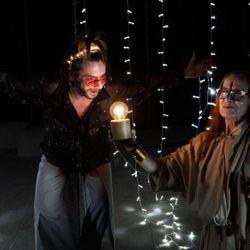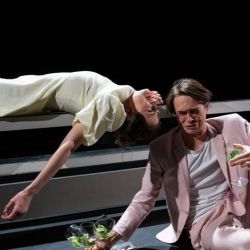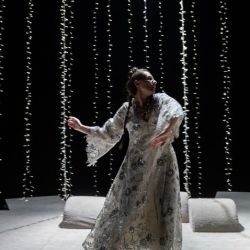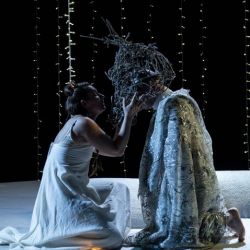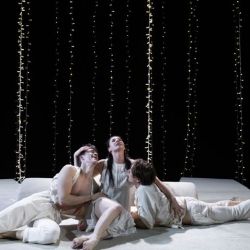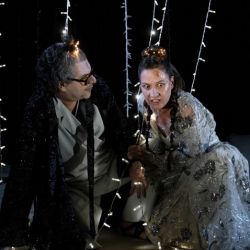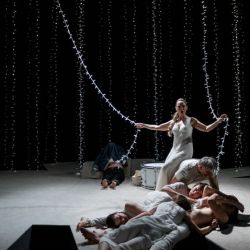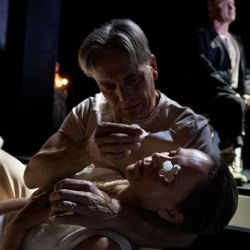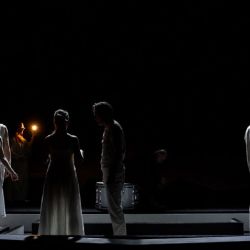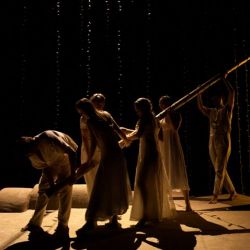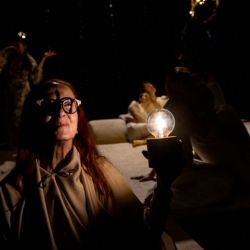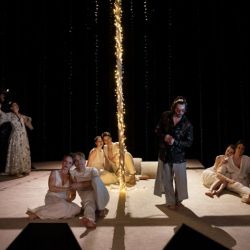William Shakespeare (1564-1616), a playwright, theatre director, actor and poet, was born in Stratford-upon-Avon to John Shakespeare, a successful glove-maker and tanner, and Mary Arden from an affluent landowning family. From 1568 to 1611 he lived in London, where he made a name for himself with his plays. He was an actor and director in various theatre companies and co-owned the famous Globe and Blackfriars theatres. Shakespeare’s writing for theatre includes 36 plays and is considered the pinnacle of Elizabethan and Renaissance drama. It is divided into several genres: histories, based on historical chronicles of England’s past, comedies, tragedies, written during his second creative period (1594-1600), considered his masterpieces, and romances. 18 plays were published during his lifetime, the other 18 were published later by two members of the King’s Men acting company, Henry Condell and John Heminges. His best comedies and tragedies presented fundamental existential questions and paved the way for subsequent playwriters. His festive play A Midsummer Night's Dream was written around 1595 and was first performed to celebrate the wedding of two ladies-in-waiting from noble families, patrons of Shakespeare’s acting company.
In A Midsummer Night's Dream, a romantic comedy, Shakespeare drew inspiration from various sources, including medieval romances, Ovid’s Metamorphoses and Chaucer’s Canterbury Tales. The play is set in Athens in the run-up to the wedding of Theseus, Duke of Athens, to Hippolyta, Queen of the Amazons. The comedy consists of five interconnecting plots, four of which portray four couples who succumb to erotic temptation on a midsummer’s night when sexual desire is more formidable than emotional commitment to the person of one’s choice. The fifth story shows a group of amateurs putting on a mythical love tragedy of Pyramus and Thisbe. A focal point of the play is the dreamlike lust of love triggered by the potion made from a magical flower. In the real world, there are requited and unrequited loves: Helena loves Demetrius, Demetrius loves Hermia, Hermia loves Lysander, and he loves her. As the plot thickens, another story begins, set in a world of fantasy and fairy-tale imagination. The fantasy world is invariably linked to reality, which speaks in favour of the fact that fantasy is an important part of life.
"With A Midsummer Night's Dream, we will collect a ticket into the unpredictable world of our own instincts. I am intrigued to find out what happens when we are allowed to derail and drown in the sensual sea of sexual impulses. When we become our own experiment, riddled with unbridled fantasies and animistic outlets. I would like to unravel the rainbow of the rise and fall of love vows, first dates, debauched apprehensions, longings, physical dependence, sex for a thousand and one nights, and then jealousy, pursuit, violence, deceit and the amusing fact that humans become bulls when they are struck by love. For a single night, the world of reality and the world of dreams merge. Dreams are made flesh, and the invisible forces of nocturnal magic mercilessly take their toll on the lovers. The consequences of a midsummer’s night lived to the full are liberating for some and devastating for others. I want to create a scene in which mortality, celebration, beauty, mourning, song and freedom are joined together. Love is blind. Love is glorious. A Midsummer Night's Dream is a vision of the epic struggle for love."
Jaša Koceli, director
Translator Jernej Županič
Director Jaša Koceli
Set designer Darjan Mihajlović Cerar
Costume designer Branka Pavlić Guček
Choreographer and assistant to director Tajda Podobnik
Composer Miha Petric
Lighting designer David Andrej Francky
Photographer Mankica Kranjec Ducheyne
Language consultant Živa Čebulj
Assistant to costume designer Tina Hribernik
Assistant to lighting designer Klemen Kuhar
Designer and manufacturer of donkey head and flower crown Gregor Lorenci
Cast
Hippolyta, Queen of the Amazons, engaged to Theseus Manca Ogorevc
Theseus, Duke of Athens Rastko Krošl
Hermia, Theseus’ daughter, in love with Lysander Lucija Harum
Lysander, in love with Hermia Lovro Zafred
Helena, a girl, in love with Demetrius Maša Grošelj
Demetrius, suitor to Hermia Urban Kuntarič
Titania, Queen of the Fairies Tanja Potočnik
Oberon, King of the Fairies Tarek Rashid
Puck Andrej Murenc
Nick Bottom, a weaver Damjan M. Trbovc
A voluntary exile from the Land of Light Jožica Avbelj, as guest
Opening 24 January 2025
Performance duration: 2 hours. No interval.
Lines from Shakespeare’s Sonnets 43, 44 and 45, 51, 76, 94 and 129, as well as Sonnets 53 and 115 in their entirety, all translated by Jernej Županič, are also used in the production.
Musicians Wiyaala (vocal), Jan Sever (piano)
Barefoot footwear manufactured by Tanja Sabol, Ritabarefoot.
Stage manager Kroflič Saša • Prompter Maša Grajžel • Lighting master Gregor Počivalšek • Sound master Mitja Švener • Property masters Roman Grdina, Ivana Matuzović • Front-of-house Simon Koštric • Make-up artist and hairdresser Andreja Veselak Pavlič • Hairdresser Sibila Senica • Wardrobe masters Nika Fartelj, Maja Zimšek • Tailor Anita Kragelj • Seamstress Ivica Vodovnik • Head of construction Gregor Prah • Technical manager Aleksandra Štern • Assistant technical manager Rajnhold Jelen



